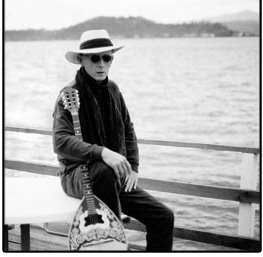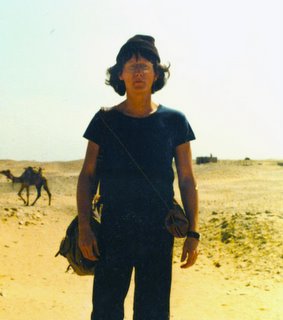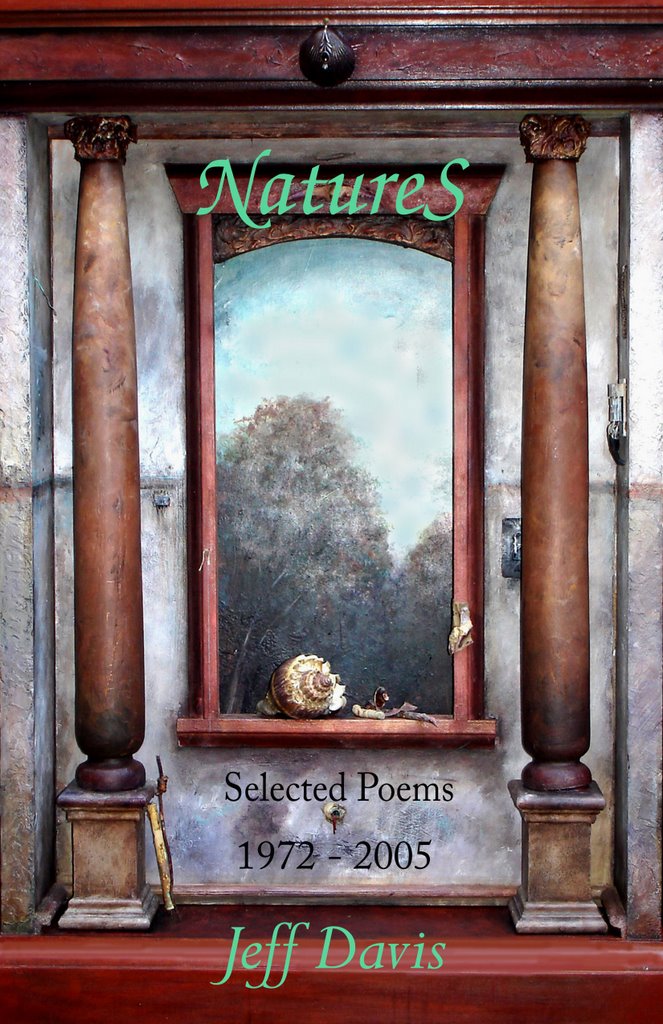Ken Wainio Leaves the Scene
 News came last week that poet Ken Wainio, one of the Baby Beat generation of San Francisco poets, has slipped off the mortal coil, and gone to have a drink with Philip Lamantia, his fellow master of the Surreal. Thomas Rain Crowe, back from France, writes that Ken died on January 26, in the hospital in Redwood Valley, CA. "He had admitted himself to the hospital on the 13th of January ... with acute stomach problems and dizziness. The doctor attributed his cause of death to liver and kidney failure. He was cremated, according to his wishes, after three days (according to Egyptian funerary rites), and his ashes were scattered in the San Francsico Bay."
News came last week that poet Ken Wainio, one of the Baby Beat generation of San Francisco poets, has slipped off the mortal coil, and gone to have a drink with Philip Lamantia, his fellow master of the Surreal. Thomas Rain Crowe, back from France, writes that Ken died on January 26, in the hospital in Redwood Valley, CA. "He had admitted himself to the hospital on the 13th of January ... with acute stomach problems and dizziness. The doctor attributed his cause of death to liver and kidney failure. He was cremated, according to his wishes, after three days (according to Egyptian funerary rites), and his ashes were scattered in the San Francsico Bay."Lamantia, who was an early advocate for Wainio's work, wrote of his Crossroads of the Other, published in 1994:
I didn't know Ken, and have come to know a little of his work only in the last few years, but the work I know does indeed spark.The very title Crossroads of the Other suggests that the poet has found the way to mediate composition, to paraphrase Andre Breton, from "communicating vessels" of unconscious sources of inspiration and conscious activity. For Wainio the erotic-marvelous arrives on dove's feet, branded with suffering, clear-obscure, even, yet flashing redolent sparks.
Here's a prose poem from Crossroads, republished late last year in the Baby Beat Generation anthology:
Getting Rid of the Ego
It's like getting married in the rain. A coach will pull up at the edge of the dam when the flood starts and the bride throws her flowers at the drowned. If you don't believe this, go to a monastery for ten years and study the light through a keyhole. Without moving your eye from the door cut out a piece of sky and wait for somebody to come with a key.
The flood is well up by this time. The dead are getting married in rowboats and copulating on pieces of wreckage. If you still don't believe it, take out your keyhole and study the drowned. They are discussing the possibilities of islands and shaping tombstones into anchors. Their children hold their breath underwater and pray to the God of Rain. He is holding himself in a cloud making everybody worship the flood. He is quite fond of suffering and has never understood sociology. But the dead come with their pogo sticks and stare up at the seat of his pants.
If you still don't get this, go sit down in the nearest bar and study the runway of faces. If anyone comes up to you and demands your marriage certificate, take out your keyhole and blast them with a peak of stars. If they arc still sitting there waiting for you to kill your ego, tell them the world is flat and has an edge like the table. Drop something transparent over the side and tell them it was the argument of Columbus on his way to the new world.
That has a real quickness, reinvents its apparent statement phrase by phrase, opening into one new lucidity after another, though at the end it remains somehow integral, a luminous unity.
Ken had been scheduled to go to France with his fellow Baby Beats for the reading series that celebrated the anthology's publication, but was too ill to make the journey. Notwithstanding that, his death came as a surprise; he had a long history of precarious health, and had seemed to have more lives than any known cat.
 Ken's friend and editor Thomas Rain Crowe assembled this biographical note:
Ken's friend and editor Thomas Rain Crowe assembled this biographical note:
Ken Wainio (1952 - 2006) was born in Ukiah, California about two hours north of San Francisco in 1952. The Rimbaud of the Baby Beats cadre from the San Francisco 1970s and one of the foremost surrealist poets and writers in the U.S., he began to write at the age of fifteen--having been influenced by the writing of the French poets Lautremont, Rimbaud and Nerval. He moved to San Francisco at the beginning of the 1970s to study at San Francisco State University with the Greek surrealist poet Nanos Valaoritis, and met the American surrealist poets Philip Lamantia and Stephen Schwartz. It was a couple years later, in an informal “poetry class” being conducted in the home of Harold Norse that he met Thomas Crowe, Neeli Cherkovski and Luke Breit, with whom he would later help to resurrect Beatitude magazine; he was co-editor of issue # 26, which appeared in 1977. During the 1970s, his poems were published in most all of the important literary magazines being produced in the Bay Area: the City Lights Review, Beatitude, LoveLights, and Bastard Angel. With Jerry Estrin, he was a founding editor of the pan-surrealist publication Vanishing Cab. After driving a taxicab for the entire decade of the 1980s, and after living for more than twenty-five years in San Francisco, he moved to Glenhaven, California, where he resided until his untimely death on January 26, 2006. His travels have taken him to Greece, Turkey and Egypt, where he has spent considerable time in the past two decades. His poems and fiction continue to be published both here and abroad in such journals as Nexus, Asheville Poetry Review, Litterature en Marche and Greges in Montpellier, France. His books include Crossroads of the Other, which was written during the 1970s, Letters to Al-Kemi (an Egyptian travel memoir), Starfuck (a novel published in 1996) and Automatic Antiquity (poems, published in 2004). Forthcoming books include a book of autobiographical fiction from New Native Press titled Scene of the Crime: Confessions of a Baby Beat and Slab Window, a collection of his most recent poems from Beatitude Press.Good news there that there's more work to come; he may be gone, but we haven't seen the last of him.
Adios, Ken, and I hope we meet the next time around. For now, let me just offer this, something you surely knew, to see you on the way; it's adapted from the Egyptian Papyrus of Ani:
O you who open a path and open up roads for the perfected souls in the House of Osiris, open up a path for him, open up the roads for the soul of Ken in company with you. May he come in freely, may he go out in peace from the House of Osiris, without being repelled or turned back. May he go in favored, may he come out loved, may he be vindicated, may his commands be done in the House of Osiris, may he go and speak with you, may he be a spirit with you, may no fault be found in him, for the balance is voided of his misdoings.Notes: The upper photo is a relatively recent shot, though I don't have a date; the lower photo was taken during a trip to Egypt in 1979. Thanks to Thomas Rain Crowe for both.
You can find the "Papyrus of Ani" in The Egyptian Book of the Dead, translated by Raymond Faulkner (San Francisco, 1998).
Here are links to some of Ken's work available on the web:
Four poems from Nantahala Review;
eight poems from Exquisite Corpse;
prose from Oyster Boy Review;
and part of Starfuck, also from Nantahala Review.
Original content © 2006.
Labels: beats, Ken Wainio, Passings, poets, surrealism

0 Comments:
Post a Comment
<< Home